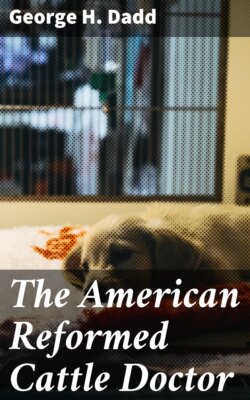Читать книгу The American Reformed Cattle Doctor - George H. Dadd - Страница 7
На сайте Литреса книга снята с продажи.
Оглавление| s. d. | |
| "13 lbs. of linseed, bruised, or 2 lbs. per day for six days, and 1 lb. for Sunday, | 1 9 |
| 32 lbs. of ground corn, or 5 lbs. per day for six days, and 2-1/2 lbs. for Sunday, at 1 d. per lb., | 2 8 |
| 35 lbs. of turnips, given twice a day for six days, and thrice on Sunday, | 1 6 |
| Oats, 1-1/2 d.: labor on each beast, 6 d., | 7-1/2 |
| Total cost of each beast per week, | 6 6-1/2 |
"The horses, cows, and young stock are also fed on this food, evidently with great advantage."
Mr. Workington, a successful dairyman, combining cut feed and oil-cake with different sorts of green food, found that, by giving a middle-sized cow sixteen pounds of green food and two of boiled hay, with two pounds of ground oil cake, (linseed would be preferable,) and eight pounds of cut straw, the daily expense of her keep was only 5-1/2 d., (about ten cents.) The oil-cake he found to be much more productive of milk when given with steamed food, than when employed without it. Varying their food from time to time is found to be of much more advantage to the cow; and this may probably arise from the additional relish with which the animal eats, or from the superior excitement of a new stimulus on the different secretions.
The following table represents the nutritive properties in each article of food:—
| Water. | Husk, or woody fibre. | Starch, gum, and sugar. | Gluten, albumen, &c. | Fatty matter. | Saline matter. | |
| Oats, | 16 | 20 | 45 | 11 | 6 | 2.5 |
| Beans, | 15 | 8 to 11 | 40 | 26 | 2.5 | 3 |
| Pease, | 14 | 9 | 50 | 24 | 2.1 | 3 |
| Indian corn, | 14 | 6 | 70 | 12 | 5 to 9 | 1.5 |
| Barley, | 15 | 14 | 52 | 13.5 | 2 to 3 | 3 |
| Meadow hay, | 14 | 30 | 40 | 7.1 | 2 to 5 | 5 to 10 |
| Clover hay, | 14 | 25 | 40 | 9.3 | 3 to 5 | 9 |
| Pea straw, | 10 to 15 | 25 | 45 | 12.3 | 1.5 | 4 to 5 |
| Oat straw, | 12 | 45 | 35 | 1.3 | 0.8 | 6 |
| Carrots, | 85 | 3 | 10 | 1.5 | 0.4 | 1 to 2 |
| Linseed, | 9.2 | 8 to 9 | 35.3 | 20.3 | 20.0 | 6.3 |
| Bran, | 13.1 | 53.6 | 2 | 19.3 | 4.7 | 7.3 |
The most nutritious grasses are those which abound in sugar, starch, and gluten. Sugar is an essential element in the formation of good milk; hence the sweet-scented grasses are the most profitable to cultivate and feed to milch cows. At the same time, the farmer, if he does not, ought to know that large quantities of saccharine matter are extracted from clover and sweet grasses by the bees. Mr. White tells us that, "on a farm situated a few miles from London, the eldest son of the occupier had the management and profit of the bees given him, which induced him to increase the number of stocks beyond what had ever been kept on the farm before. It so happened that the sheep did not thrive so well as in former years, and on the farmer complaining at the cause to his man, as they had plenty of keep, the man replied, 'You will never have fat sheep so long as you suffer my young master to keep so many stocks of bees; they suck all the honey from the flowers, so that the clover is not half so nourishing, and does not produce half such good milk.'" Had this man been acquainted with agricultural and animal chemistry, he would have had a clear conception of the seeming absurdity. All our labor or efforts to improve stock or crops will be fruitless, unless guided by chemical science. We must have sugar, starch, gluten, and other materials, to perfect animal organization. The animal may be in good health, the different functions free and unobstructed, and possess the power of reproducing the species; yet, if fed on substances which lack the materials necessary to the composition of bones, blood-vessels, and nerves, sooner or later its health becomes impaired. Reader, if you own cattle, and wish to preserve their health, give them boiled food occasionally; let them have their meals at regular hours, in sufficient quantity, and no more, unless they are intended for the butcher; then, an extra allowance may be given, with a view of fattening. They should be well littered, and the barns well ventilated; finally, keep them clean, avoid undue exposure, and govern them in a spirit of kindness and mercy.
